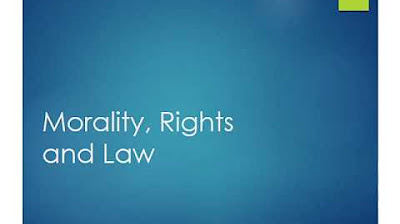Law: The Legitimacy of Charter
Summary
TLDRThis lecture explores the legitimacy of judicial review through the Canadian Charter of Rights and Freedoms. It discusses the shift of power from parliament to courts, the role of courts in protecting individual rights, and the challenges this presents. The lecture also addresses the interpretation of rights, the balance between individual and community rights, and the adaptability of the charter in a changing society.
Takeaways
- 🏛️ The Charter of Rights and Freedoms in Canada was established to protect individuals from state overreach, shifting power from Parliament to the courts.
- 🌐 Prior to 1982, Parliament was supreme and set the laws, but the Charter introduced a system where courts determine if rights are violated.
- 👥 The Charter focuses on individual rights rather than federal or constitutional issues, which are left to Parliament.
- 🤔 The legitimacy of judicial review and the shift of power to unelected judges is a subject of ongoing debate.
- 📉 Any Canadian court decision based on the Charter of Rights becomes law across all of Canada, making the impact of such decisions far-reaching.
- 🚫 A law that violates the Charter becomes void, and the government cannot change the law back without going through the courts.
- 👥 The courts' role in protecting minority rights is crucial for maintaining democracy, as even democratic governments can be a threat to it.
- 📜 Courts promote transparency by making their decisions public, unlike government decisions which can be buried in bureaucracy.
- 🏢 The Charter protects individual rights against state and corporate control, ensuring personal freedoms and equality.
- 🔍 The Charter allows for democratic dialogue through judicial review, where courts can suggest changes to laws without automatically voiding them.
- 🌐 The Charter is not static and must adapt to new social, political, and historical realities, allowing for reinterpretation over time.
Q & A
What is the primary purpose of the Charter of Rights?
-The Charter of Rights is designed to protect individuals from the state by setting a set of rights that the courts determine if are being violated or not, rather than parliament.
How did the power dynamics change with the introduction of the Charter of Rights in Canada?
-Before the Charter of Rights, parliament was supreme and set the laws, with courts applying them. Post-1982, power shifted to the courts to interpret and apply the Charter, placing limits on parliament's power.
Why is the shift of power from parliament to the courts problematic according to the lecture?
-The problem arises because the courts, unlike parliamentarians, are unelected, and decisions made by a few judges can affect the entire country, potentially leading to an interventionist state.
What is the significance of a court decision based on the Charter of Rights in Canada?
-Any court decision based on the Charter of Rights becomes law across all of Canada, making any law that violates the Charter void.
How does the Charter of Rights protect individual rights against the state and corporations?
-The Charter prevents the state and corporations from infringing on rights such as freedom of speech, equality, and the right to vote, ensuring individuals are not controlled by these entities.
What is the role of the courts in a democratic society as discussed in the lecture?
-The courts protect the rights of minorities and act as a check on government overreach, ensuring that democratic governments do not undermine democracy.
Why is the interpretation of the Charter of Rights not considered originalist in Canada?
-Canadian courts and legal scholars view the Charter as capable of growth and development over time to meet new social, political, and historical realities, rather than being a fixed document.
What is the difference between the Canadian Charter of Rights and the U.S. Constitution in terms of protecting rights?
-The Canadian Charter of Rights is more open to interpretation and change over time, while the U.S. Constitution has a legal perspective that has shifted towards originalism, emphasizing the framers' intent.
How does the Charter of Rights allow for democratic dialogue?
-It allows for judicial review, where courts can reinterpret laws and communicate with legislators, suggesting changes to laws without automatically voiding them when Charter rights are violated.
What are the main themes covered under the Charter of Rights?
-The main themes include fundamental freedoms, democratic and political rights, mobility rights, legal rights, and language rights.
What is the 'trick' sentence in the Charter of Rights that nullifies the entire document, as hinted in the lecture?
-The trick sentence is not explicitly mentioned in the script, but it suggests that there might be a clause or phrase that could undermine the Charter if interpreted in a certain way.
Outlines

Этот раздел доступен только подписчикам платных тарифов. Пожалуйста, перейдите на платный тариф для доступа.
Перейти на платный тарифMindmap

Этот раздел доступен только подписчикам платных тарифов. Пожалуйста, перейдите на платный тариф для доступа.
Перейти на платный тарифKeywords

Этот раздел доступен только подписчикам платных тарифов. Пожалуйста, перейдите на платный тариф для доступа.
Перейти на платный тарифHighlights

Этот раздел доступен только подписчикам платных тарифов. Пожалуйста, перейдите на платный тариф для доступа.
Перейти на платный тарифTranscripts

Этот раздел доступен только подписчикам платных тарифов. Пожалуйста, перейдите на платный тариф для доступа.
Перейти на платный тариф5.0 / 5 (0 votes)






